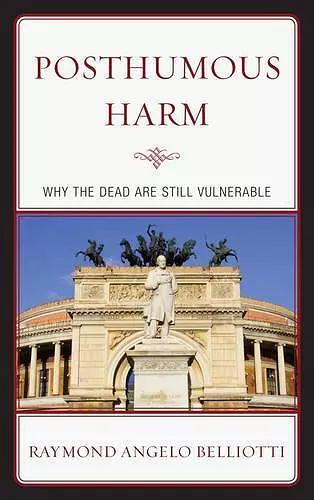Posthumous Harm
Why the Dead are Still Vulnerable
Raymond Angelo Belliotti author
Format:Paperback
Publisher:Bloomsbury Publishing PLC
Published:20th Aug '13
Currently unavailable, and unfortunately no date known when it will be back

Reasonable people agree that, other things being equal, it is immoral to fail to fulfill deathbed promises, to maliciously defame the dead, and to mistreat corpses. But philosophical controversy swirls over why such acts are morally wrong. Are these acts wrong only because they violate moral norms against breaking promises, lying, and abusing others? Are these acts morally deficient because they wrong the dead? Are these acts morally wrong because they harm or injure the dead? Or are these acts blameworthy because they wrong, harm, or injure those who survive the deaths? Who are the genuine victims, if any, of these morally wrong acts?
When first confronting such questions seriously, we discover paradoxes. On one hand, we are inclined to think that the dead person is in some sense wronged, harmed, or injured by posthumous treachery. After all, when a promise is broken, when someone is maliciously defamed, and when someone’s request concerning the disposition of his remains is dismissed, we are inclined to think of the victims as the promisee, the defamed person, and the ignored person, respectively. On the other hand, in the case of the dead there are no “people” who might be identified as victims. Assuming that death marks finality, once we are dead we are no more. So perhaps the typical moral paradigms dissolve in such cases. Posthumous Harm: Why the Deadare Still Vulnerable addresses these issues and the host of questions surrounding them.
Engagingly written and tightly argued, Posthumous Harm clarifies the paradoxical intuition that we can harm the dead even if their consciousness has been extinguished. If death is the end of all experience, then the dead seem safe from harm. So why do we take care to dispose of their remains and assets as they wished? Why is it wrong to besmirch the reputation of Cicero or Rocky Marciano? How can there be harm if there is no subject to experience the harm? Considering the hypothetical posthumous defamation of Rocky Marciano, Belliotti makes a convincing case that the prize fighter can be harmed today even though he has been dead since 1969. Taking inspiration from Aristotle and Kant, and engaging contemporary philosophers including Nagel and Feinberg, Belliotti has produced a truly unique work, the only book-length study of the issue. -- William Irwin, King's College, Pennsylvania
ISBN: 9780739185995
Dimensions: 229mm x 152mm x 15mm
Weight: 318g
206 pages